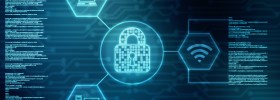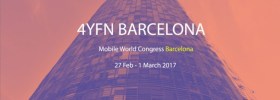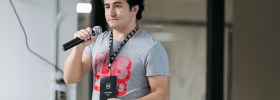By Kathryn Parsons (@KathrynParsons), CEO and co-founder of Decoded
The word revolutionary is tossed around relatively freely today, and applied to anything from new smartphones to the latest probiotic yoghurts. However one of the few truly revolutionary advances that we’ve made as a society in the last few decades has been the invention of the internet and the World Wide Web that sits on top of it.
 The web has revolutionised almost every single aspect of our day-to-day and professional lives. It is now easier to think of things not directly impacted by the digital revolution than to think of those things that are.
The web has revolutionised almost every single aspect of our day-to-day and professional lives. It is now easier to think of things not directly impacted by the digital revolution than to think of those things that are.
And because of this, I strongly believe that everyone should feel an innate sense of responsibility for the web, as ultimately all of our lives have been dramatically affected by it in the last 10, 15, even 20 years, in ways we could never have imagined.
Think about the industry you joined five years ago. Whether it was marketing, publishing, finance or the arts, every single one has been built up, blown apart and reshaped again by digital. The web is one of the most democratic tools that exist and we all play a role in shaping it. Opting out of the web isn’t really an option any more when it’s affecting our lives, businesses and ultimately our economies on a daily basis. And I worry that if we leave it to others to shape and ultimately control we risk losing what’s most important about the web – its openness.
Coding now as essential as learning to read and write
However, despite the web permeating and shaping almost every aspect of our lives, the code – the building blocks of the web – remains shrouded in mystery and intrigue. Ask anyone on the street and 99 out of 100 people will not know how to code, or even know the names of even the most basic of the coding languages. This is very worrying, as the web’s future as an open, collaborative and democratic platform cannot be guaranteed if only the few control its destiny.
Coding is no longer a ‘nice to have’; it is a ‘need to have’. It is the new literacy, the new language in which everything is being evolved and shaped. That our children are not being taught the nuts and bolts of coding in school today astounds me. It’s on par now with learning how to speak, write and count. Basic digital literacy is an absolute must have.
Young people are always heralded as the future generations, the foundations of tomorrow’s society. And despite Generation Z being inherently comfortable with technology we are risking bringing the next generation up as digital philistines. Arguably some youths are engaged in the coding and building of the web today, but not nearly as much as they could be.
We are only scratching the surface of the energy and enthusiasm we could inspire. There are lots of intelligent, energetic young people out there but only a fraction of them are learning to code on the web. We’re at the very foot of the mountain.
Consuming technology not the same as controlling it
The problem is we treat coding like a dark art, when actually it is no different to learning a new spoken or written language such as French or Italian. The generations of young people who grew up with the BBC Micro and ZX spectrum, with the command line cursor inviting them to code, are the most empowered people today. They have had hands-on experience of controlling computers and as the world has gone digital, building and influencing the world around them.
Unfortunately although kids today are mind-blowingly tech-savvy, they are also disconnected from the command line. At the moment there is a huge divide between “I have an idea” and “I can actually create it”. Young people are so creative, ambitious and aspirational and their ideas are limitless. We have worked in schools and when you ask them what they want to create and then give them the tools to create, the results are incredible. That’s coding! It’s the new building blocks of the world around us.
The web is one of the most democratising tools in world and its potential for good is unlimited. Its open culture is incredibly important to evangelise about, and it is up to us to spread, protect and educate the next generation about open web standards and values. The problem we have today is that while Generation Z feel extremely comfortable with technology, they are not inspired to want to create, build or develop with it. Coding is seen as a dark art, and those that can code are viewed as some sort of master of the dark universe.
I’ve explained this in this video – take a look
[youtube]http://youtu.be/cHadg9eqEO4[/youtube]
Parallels can be drawn in with mathematics. To many, it is seen as a dark art and admittedly there are elements of the subject that highly intelligent people devote their entire lives to exploring and understanding. But basic mathematics – additions, multiplications, subtractions and so on – are an invaluable tool in any child’s education and future success in life. But ask any child if they want to learn it, and no more than 5% at most will say yes.
Those 5% will be the ones who go on to innovate and change the world, but fundamentally the person who doesn’t want to become a mathematician becomes something else – an entrepreneur, a CEO, a strategist – and it is very handy that they understand mathematic principals in these jobs! It is exactly the same with code and technology. There should not be a debate about whether we should or should not teach basic coding to young people, it is vital.
Apathy is the biggest enemy
The real problem we have now is apathy. Most of the children we speak to through Decoded love the applications they use on a daily basis – from Facebook to Snapchat – but they have no desire or drive to create programmes and platforms of their own. Ironically, technology has actually reduced the barriers to entry to be entrepreneurial. Anyone can learn to code relatively easily, build a website or an app, get it online and charge users or sell advertising. It might not make you a million, but you are effectively starting your own business with incredibly low barriers to entry.
Ultimately you can’t teach anyone anything that they don’t want to know, you can only really inspire a desire to learn. You can facilitate the learning process but it’s the young people themselves who catch the bug and start wanting to build and make things. In some ways the responsibility falls to the parents, the teachers and organisations such as Decoded and the brilliant Raspberry Pi Foundation. But governments also have a huge role to play in embedding coding and other technology best practice within the curriculum so all young people leave school with at least a base level of knowledge.
Because if we don’t then we risk creating a situation where the world we live in is administered by a digital elite. We’re already seeing uncomfortable divides open up between the corporate and hacker world, and I bet organisations like Anonymous will one day be looked back on as the founding fathers of the web’s counter culture as the gap between those that understand the web and those that don’t widens.
Therein lies the heart of the issue. How can the web remain open, collaborative and democratic if the power lies in the hands of a few? Who is responsible for its future? People at the moment are scared. They don’t know who is storing and accessing their data, and who is controlling both their data and the technology they use.
The fact is that innovation and progress are nourished by openness. Let’s empower young people to communicate and collaborate better. Let’s help them start sharing knowledge and information more, and help them lay the foundations of a protocol of the future that is open, creative, collaborative and mutually valuable.
Let’s create a common language and a shared set of standards that are adopted and used by young people and businesses around the world. The web is an infinitely adaptable medium with infinite possibilities.
Can you imagine anything more exciting?
Openness is worth fighting for so add your voice – “I support openness in digital, technology & innovation #TheOpenAgenda http://bit.ly/openagenda” Tweet this directly ![]()
![[Guest Post] Coding and the open web – #TheOpenAgenda | Decoded’s Kathryn Parsons](https://en.blogthinkbig.com/wp-content/uploads/sites/5/2014/07/shutterstock_119236960-coding.jpg?resize=610%2C225)

![[Guest Post] Human progress can only come through openness – #TheOpenAgenda | Mozilla’s Mitchell Baker](https://en.blogthinkbig.com/wp-content/uploads/sites/5/2013/07/shutterstock-open-web.jpg?resize=p%2Co)
![[Guest Post] An open philosophy can unify the fragmenting web – #TheOpenAgenda | Max Firtman](https://en.blogthinkbig.com/wp-content/uploads/sites/5/2013/03/open-web-html5.jpg?resize=p%2Co)





